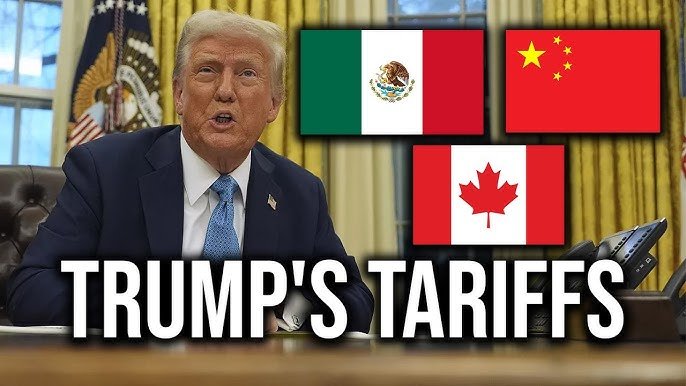Trump tariffs,The ongoing trade tensions between the United States and China have escalated once again. With former President Donald Trump imposing fresh tariffs, China has hit back with its own set of countermeasures. This latest trade war move has sent shockwaves through global markets, impacting industries from energy to technology.
The New U.S. Tariffs and China's Swift Response
Just past midnight on the U.S. East Coast, Trump's administration imposed a 10% tariff on various Chinese goods. In response, Beijing wasted no time in announcing retaliatory measures, including new tariffs on American imports.
China’s response includes:
15% tariffs on American coal and liquefied natural gas.
10% tariffs on crude oil, farm equipment, and select vehicles.
These counter-tariffs will take effect on February 10, further intensifying the ongoing economic standoff.
China's Criticism of U.S. Trade Policies
China's finance ministry issued a strong statement condemning the new tariffs. It argued that these measures violate World Trade Organization (WTO) rules and do little to resolve America’s own economic challenges. Instead, China claims, these tariffs disrupt international trade and harm both economies.
China Launches an Investigation into Google
As part of its retaliation, China's market regulator launched an anti-monopoly investigation into Google. Though this move was not explicitly linked to the tariffs, it underscores the growing economic hostilities between the two nations. This probe could lead to restrictions on Google's operations in China, potentially shaking up the global tech industry.
China Tightens Export Controls on Rare Metals
In another strategic move, China’s commerce ministry and customs administration introduced new export restrictions on rare metals such as tungsten, indium, and molybdenum. These materials are crucial for high-tech manufacturing, including semiconductors, electric vehicles, and aerospace components. By limiting exports, China aims to leverage its dominance in this sector against the U.S.
Two Major U.S. Companies Blacklisted
China has also added PVH Group and Illumina, Inc. to its "unreliable entity" list. These firms, accused of violating market principles and discriminating against Chinese businesses, now face operational challenges in China.
PVH Group owns popular brands like Tommy Hilfiger and Calvin Klein, which may see disruptions in their Chinese market presence.
Illumina, Inc., a leader in genetic sequencing, could face hurdles in accessing China's biotech sector.
The Reason Behind Trump's Tariff Strategy
Trump’s decision to impose tariffs isn’t solely about trade. The former president signed these orders as part of a broader effort to pressure China, Canada, and Mexico to tighten border controls and curb the inflow of illegal drugs, particularly fentanyl, into the U.S.
While tariffs against Mexico and Canada were temporarily paused following border security agreements, the pressure on China remains high. Washington has long accused Beijing of supplying precursor chemicals for fentanyl production, a claim China denies.
(1).jpg)
China Takes Its Case to the WTO
China has vowed to challenge the new tariffs at the World Trade Organization (WTO). While the WTO's ruling process is slow, this move signals China’s determination to fight back through diplomatic channels as well.
Trump Hints at Further Tariffs
Trump has made it clear that he is willing to escalate the trade war even further. If China continues its retaliatory actions, he has warned of increasing tariffs beyond the current levels.
Meanwhile, Karoline Leavitt, the White House spokesperson, confirmed that Trump planned to discuss the issue with Chinese President Xi Jinping in the coming hours. The outcome of this conversation could determine the next phase of U.S.-China trade relations.
The Global Impact of This Trade War
The repercussions of these Trump tariffs extend far beyond the U.S. and China. Key global markets, including energy, agriculture, and technology, are bracing for disruptions.
Energy Sector: Higher tariffs on U.S. coal and LNG could impact American energy exporters and raise global prices.
Automotive Industry: Increased tariffs on vehicles may hurt U.S. car manufacturers that rely on Chinese supply chains.
Technology Firms: The Google probe and rare metal restrictions could have long-term implications for tech giants reliant on Chinese resources.
More News: todays stock market news and analysis
Conclusion
Trump tariffs With tensions escalating, the U.S.-China trade war shows no signs of cooling down. Both sides are digging in, using tariffs, export controls, and regulatory crackdowns as economic weapons. Whether negotiations will ease these tensions remains uncertain, but one thing is clear—this battle is far from over.
Other Popular Blog Post:
Trent Share Price | India Economic Survey 2024-2025 | JSW Energy Share Price | Tata Tiago Accessories | Republic Day | Guillain-Barré Syndrome | New Tax Regime 2025 | SSC GD Admit Card 2025
Explore other popular Posts:
Blog | News | Entertainment | Education | Sports |
Technology | Cryptocurrency | Stock | Home | Sitemap





